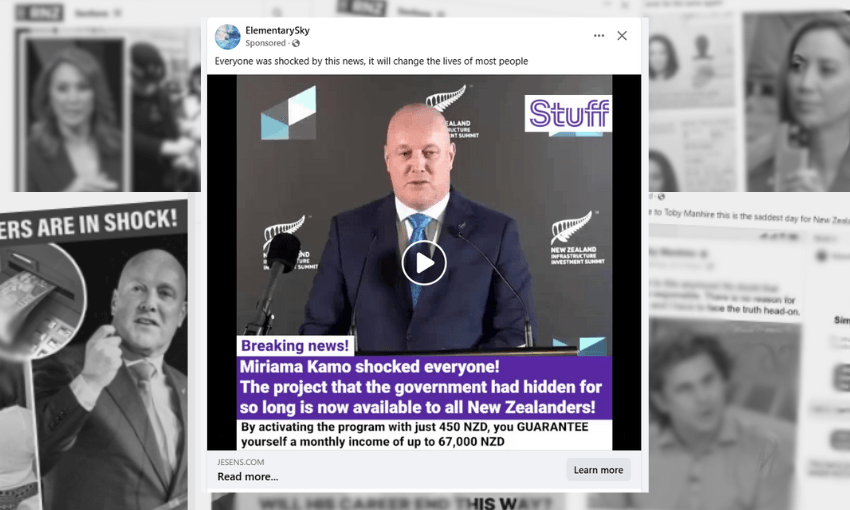Meta is doing nothing to combat scams on its platforms, but what about the government? Dylan Reeve searches for someone in charge.
In August last year I outlined my dystopian descent into the world of Facebook scam advertising and the seemingly futile attempt to combat them. Reaching out to Meta directly was fruitless, and reporting the ads using their built in tools seemed to do nothing.
Now, eight months later I’m happy to report — nothing.
There doesn’t seem to have been any meaningful change.
My reports, when I can be bothered making them, are still mostly met with a cheery “nothing to see here” response, and the barrage of ads keeps coming.
My collection of scam ads — ads that I have personally seen and screenshotted while browsing Facebook on my desktop PC — now stands at more than 320 items.
I don’t capture every scam ad I see. I don’t even use Facebook every day.
But most days when I do visit the site I’m confronted with a wide variety of fraudulent claims promising me money, spruiking fake products or making dramatic health claims. Many of the ads feature familiar faces — Taika Waititi, Peter Jackson, Ashley Bloomfield, Elon Musk, Miriama Kamo, Jack Tame, Christopher Luxon… the list goes on.
Many users probably just zone the ads out and ignore them, like the many legitimate ads they see every day. Some people probably don’t even see them thanks to the ad blockers they run in their web browser. But for a small number of Facebook users, these ads are the first step in a horrible journey that might see them losing hundreds of thousands of dollars.
So when I saw yet another ad exploiting the likenesses of well known New Zealanders in an effort to lure more victims, I decided to dig in again.
The ad followed a familiar narrative, suggesting that some celebrity had let slip on a live interview the secret to limitless wealth. Sometimes they’re in trouble with the police for doing so, but in this case Miriama Kamo had apparently let the cat out of the bag a little early.
The ad features a video — which would start playing automatically for many mobile users — in which Miriama Kamo is being interviewed by Anika Moa. The AI-manipulated video has Moa interviewing Kamo about a previously secret project that could “transform citizens’ financial lives, offering a guaranteed income of over $45,000 New Zealand dollars per month”.
The video, complete with Stuff branding — perhaps ironic given the publisher’s recent three-part series about online scams — goes on to explain that Kamo’s whistle-blowing prompted a response from prime minister Christopher Luxon, after which he appears on screen assuring New Zealanders that the platform is safe, reliable and guaranteed by the government.
I reported the ad to Facebook and, as usual, a week later they let me know that they “use a combination of technology and human reviewers to process reports and identify content that goes against our Advertising Standards. In this case, we did not remove the ad you reported.”
As I write this today, the advertiser is still running versions of this ad, as well as a similar one targeting Indonesian users.
So I decided I wanted to hear from the protagonists of this fraudulent financial miracle.
“The first time I realised the scale of the problem was when I was presented as selling weight loss gummies!” For Miriama Kamo it’s not a new experience finding herself as the unwilling face of some scam ad on Facebook or Instagram. By the time we spoke on the phone it felt old hat to the nationally recognisable TV journalist.
“It does start to feel a bit hopeless,” Kamo mused. She’s reported ads herself, and encouraged others to do so. She has even tried to reach Meta directly about the issue, but hasn’t seen anything change. “I don’t want it to seem like I don’t care, because I really do. But I’m starting to feel a little lost – I don’t know what I can do about it.”
The latest ad, featuring Kamo in conversation with Anika Moa, felt like an escalation. “That is probably the most convincing one I’ve seen so far, although thankfully I’ve not had much engagement from people asking me about it,” she says of the AI-generated clip. “It’s probably the most sophisticated one, where they’ve got aspects of my voice down pretty good.”
While this ad doesn’t seem to have made a big splash, at least amongst those inclined to reach out to Kamo, other ads using her image have clearly been effective, as she’s frequently featured.
“It was actually quite amazing how many people have been fooled. Even an ‘auntie’ of mine said ‘I’ve spent the money but haven’t received anything’ I had to say no no no, you’ve been scammed,” Kamo recounted of one of the fake products marketed with her image. But it wasn’t an isolated event. “I’ve had hundreds of messages from people saying anything from ‘this is fake, isn’t it?’ to the other end which was ‘I’ve spent money on this and you haven’t sent my product yet.’”
At this point Kamo feels helpless about it all. “I urge people to report the ads. But I urge them in the knowledge that it’s not really going to do anything,” she says. Her optimism about Meta’s ability, or willingness, to tackle the problem is non-existent. “I have very little faith in Facebook. Zero, actually. I don’t think Facebook gives a toss at all.”
Of course there were other people’s images being used in the video that started me on this journey.
While I don’t have Christopher Luxon’s personal contact details in my phone, I do have details for his press office, so I sent off an email — optimistically I asked to speak to the PM personally on the matter, but knowing that was unlikely I also threw in some specific questions about the issue of the PM’s image being appropriated by scammers, and who ought to be doing what about it.
I had the same question I’ve always had about this issue, namely: If Meta is seemingly unable, or unwilling, to tackle this issue, who in government is responsible for taking them to task on that?
For the prime minister’s office, the question is especially pointed, as his image is being used to promote scams. If he is unable to personally take Meta to task on the matter, there must be some agency or minister that can do it on his behalf? Can scammers really just be allowed to continue using the name and likeness of the prime minister, and exploit the authority and trust of the government in order to promote fraud?
Unfortunately I couldn’t get more than a simple emailed statement, to be attributed to “a spokesperson for the prime minister”, which said: “Online scams are a growing problem in New Zealand and overseas. As technology becomes more sophisticated, unfortunately, so do scams, and thousands of Kiwis are caught up each year. It is distressing for anyone who falls victim to a scam.”
It concluded with: “The prime minister would never endorse a particular investment.”
While Luxon’s office said they did “flag” scams featuring his likeness that they were made aware of, they didn’t elaborate on who they flagged them with.
As for a minister in charge of finding the answers, the government announced in November that Andrew Bayly, in his role as minister of commerce and consumer affairs, would lead efforts to better tackle the growing issue of online scams. However it was a little unclear once Andrew Bayly stepped down from his ministerial portfolio what would become of that effort.
The answer was revealed last Wednesday when Bayly’s replacement, Scott Simpson, announced the outcome of a second anti-scam roundtable between industry stakeholders and the government. A decision had been made about what would be done… but Simpson wouldn’t actually say what it was, telling The Post, “I don’t want to go into detail at the moment because I need to brief my parliamentary and cabinet colleagues.”
While Simpson wouldn’t say, The Post suggested it would be a non-governmental organisation run by the banks — possibly through their “Get Verified” entity that was established to implement “confirmation of payee” for bank transfers.
With no details forthcoming, I can only speculate, but if The Post’s reporting is correct, then it seems that the new entity might possibly operate in a similar way to Netsafe — as an external entity authorised by legislation to take reports from the public and pursue whatever actions the government deems suitable.
Being led by the banking sector suggests a focus on the direct financial transaction parts of online scams, however many scams deliberately avoid using traditional financial institutions, and there remains plenty of opportunity to have a meaningful impact closer to the root of the problem, with the proliferation of scam ads like those so often found on Facebook and Instagram.
Reached by email, Scott Simpson said, “I am taking my responsibility as lead anti-scam minister seriously.” He confirmed that he’d had discussions with Meta and other platforms about the issue, adding, “I have heard from Meta and Apple about the steps they are taking to stop scams and fraud on their platforms.”
As for the future, Simpson pointed across the Tasman, saying, “I have also reiterated to the digital platforms that I would like to see them agree to an industry scam code, like the one they have agreed to in Australia.”
Whether these efforts will have a meaningful impact remains to be seen. In the meantime it seems likely that people like Anika Moa, Miriama Kamo and Christopher Luxon should expect to keep seeing themselves being used as the bait to attract new scam victims.


